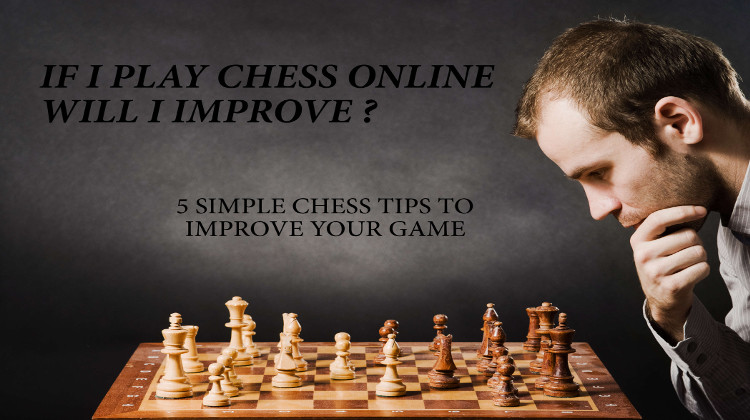 Everyone that plays chess wants to improve. Winning is better than losing, especially if you are playing against a remorseless computer opponent! Learning chess as a beginner brings rapid progress, but once we understand how chess pieces move and some of the unusual chess moves what next? This article offers a few pointers in order to keep learning to play better chess after the initial rapid development phase enjoyed by chess novices.
Everyone that plays chess wants to improve. Winning is better than losing, especially if you are playing against a remorseless computer opponent! Learning chess as a beginner brings rapid progress, but once we understand how chess pieces move and some of the unusual chess moves what next? This article offers a few pointers in order to keep learning to play better chess after the initial rapid development phase enjoyed by chess novices.
If I Play Chess Online, Will I Improve?
This is a common question that people ask me when they learn I have an online chess site. The answer is both simple and complex. Generally, the people asking this question are new to the game and so the answer is definitely that yes, they will improve. However, what about those who have learned the basic chess moves, elementary tactics and strategy, and are looking for more? Players learn chess in a variety of ways. Each player will have their own strengths and weaknesses. This diversity makes giving generalized advice complicated.
Most chess novices try to learn the openings, but this rarely does much good. At low skill levels your opponent rarely plays the predicted move anyway. Far better is to acquire chess pattern recognition skill that relate to chess and learn basic checkmates. While elementary chess tactics can be trained online, or by computer chess software, doing so quickly become dull due to repetition. What is needed is a way to learn and play chess online, in order to maximize growth and still keep things fun. What follows are my personal top five chess tips for new-ish players.
5 Tips for Better Chess
1. Play more games
Yes, seriously. Pattern recognition is a significant factor in a chess players overall strength. The experience of playing more games means that it becomes more likely that you will experience moments where position looks familiar and you will know what to do, or at least which moves did not work last time!
One word of caution though, play little and often. Marathon sessions will almost guarantee mental fatigue. Tiredness will destroy enjoyment, give fewer victories and hamper learning.
2. Mix it up
- play black
- try different openings
- change the tempo
Playing more games is important, but little will be learned if we always play similar moves. If you normally play white, play black. If you normally open with a kings pawn opening looking for an exciting, open position, try playing a defensive queens pawn opening and grind out a win that way. Or, if you normally play blitz chess, play slowly and consider each move fully. You get the idea?
Mixing things up can really help to keep your chess game fresh. If you experiment more, you may not win as often, but you will surely learn more.
3. Opponent Difficulty
This is an important factor to get right. We learn more when we play stronger opponent’s, but playing against a computer chess program like Stockfish on its strongest settings and losing every game will get dull very quickly. Equally, stomping your opponent might be fun once in a while, but you will learn very little.
Broadly speaking a good compromise is to play chess against the computer at a level that will allow you to win about one game in three. This level of difficulty ensures learning. Any victory will be well earned and not feel hollow.
4. Play like your life depends on the outcome!
Losing feels bad. The human mind is very good at providing excuses to soften the sting of losing. Banish excuses like “I wasn’t really trying” or “I would have won, but my TV/iPhone/pet distracted me”. There are distractions even at over the board chess tournaments.
Discipline yourself to concentrate no matter the distractions. Apart from improving your chess, better powers of concentration will improve your life in a large number of ways.
Even if chess strategy is not your thing, at least look a few ply ahead. Try to guess your opponents move, then your best reply and then his and so on.
5. Record games for later analysis
Most computer chess software records your moves as you play. Even if you are not playing chess online, recording your moves in a face to face game will really help you improve, but only if you analyse those moves! Storing the games and never looking at them again is obviously of little use.
The analysis should ideally be conducted by a stronger player or chess engine, but this is not absolutely necessary. Playing through your own games and applying a few minutes thought toward finding better alternative moves will often be fruitful. Your discovery of these hidden gems will be also more easily remembered.
Any Other Suggestions to Improve When You Play Chess Online?
I hope that these five chess tips will help you on your journey to becoming a better chess player. Although I have listed five ways learning to play chess online can work, I am sure there are many more. Feel free to drop me a line in the comments below if you have any constructive suggestions to help others improve their play.